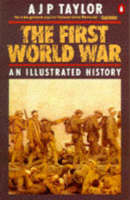
The First World War: an Illustrated History (1963) by Alan John Percivale Taylor
Paperback, Penguin, 296pp., Illustrated
Taylor was one of the preeminent British historians of his time. Generally regarded as something of a populist, he wrote many articles and appeared often on television. From what I can tell, he was percieved to be very anti-German, anti-American and mildly pro-Soviet.
This book outlines the first World War chronologically from the killing of Ferdinand in 1914 right through to the mad scramble for land and autonomy in Europe after the Treaty of Versailles. He concentrates mainly on the leaders and generals of the major countries in the war; showing that outmoded battle techniques, political gameplaying and ever shifting alliances all contributed to the horrific loss of life 15 million dead).
His thesis is that the main players (France, UK, Germany & Russia) all subscribed to the pre-war idea that if their preparations to mobilize their forces were greater than their rivals that would act as a deterrent. Functionally, what that did when war broke out was mean that the combatantants threw their strongest concentrations of troops at the the most defended points along the line. This wrongheaded strategy persisted throughout almost the entire First World War.
This book was a clear and concise explanation of the major plotlines of a war that, with time, is fading from the collective consciousness. A worthwhile read.

1 comment:
I just read about half of Keegan's "first world war" and I had to drop it because there was too much of the intricate moves of the generals and their flanks and so on. I don't need to know how thirsty the Polish donkeys were, etc.
This one sounds better.
I did find the "first out of the gate" theory very interesting - the one you describe here as massive force against defensible positions.
And I was so disppointed to read, in Keegan's book, about the opportunities for diplomacy, ahem, that broke down, especially in Russia, who, it seems to me, could have prevented the entire thing if they had let Austria and Serbia work it out alone AND left Germany to "back up" Austria with diplomatic strength alone.
Another failure was the flim flamming of the Austrians. There is a line in Keegan that goes something like, "so now the Austrians did what they could have done four weeks ago (invading Serbia) without raising much of an eyebrow, except now all of Europe was involved."
The whole thing sucks.
Post a Comment